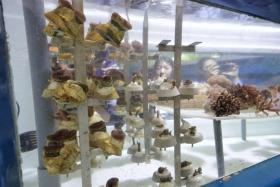Asia’s first Seabin now at Singapore Yacht Club
A floating rubbish bin that can collect the ocean's trash is now bobbing in the waters of Singapore.
Wartsila Corporation, a Global Pilot Partner of the Seabin Project since 2017, has donated Seabins to different marinas around the world.
Asia's first Seabin was installed at the Republic of Singapore Yacht Club yesterday.
The Seabin is now in about 15 countries, including Finland and the US. The first Seabin was installed in October last year in England.
The Republic of Singapore Yacht Club in the West Coast was chosen because of the calm environment and available manpower resources.
SUSTAINABILITY
Seabin Project's chief executive, Mr Pete Ceglinski, 39, said: "Singapore is a leader in environmental sustainability, with a blueprint and a vision for a liveable and sustainable country.
"Early on, the correlation between a healthy environment and the quality of life was recognised here - which is why it is no surprise that this 'garden city' is the first in Asia to install a Seabin."
The Seabin, 50cm in diameter and 50cm tall, weighs about 47kg and can be placed in waters at marinas, docks, yacht clubs and commercial ports. It is positioned where the wind and the current can push the debris into it.
Water is sucked from the surface - using a submersible pump that can use clean energy sources such as solar power - and passes through a catch bag inside the Seabin. The water is then pumped out, leaving litter and debris trapped in the bag.
The Seabin, which costs about $5,000, can also collect oils and pollutants floating on the water.
The bin can catch about 1.5kg of debris and litter a day, depending on weather and debris volume and can also catch microplastics that are 2mm in size.The catch bag can hold up to 20kg and needs to be emptied twice a day.
Wartsila is looking into having two other Seabins installed in Singapore.
Wartsila Singapore managing director Mervin Ong, 63, said: "Our purpose is to enable sustainable societies with smart technology. This includes cooperating with like-minded individuals and companies, such as Pete Ceglinski and the Seabin Project, to develop and implement new environmental technology."
Get The New Paper on your phone with the free TNP app. Download from the Apple App Store or Google Play Store now


